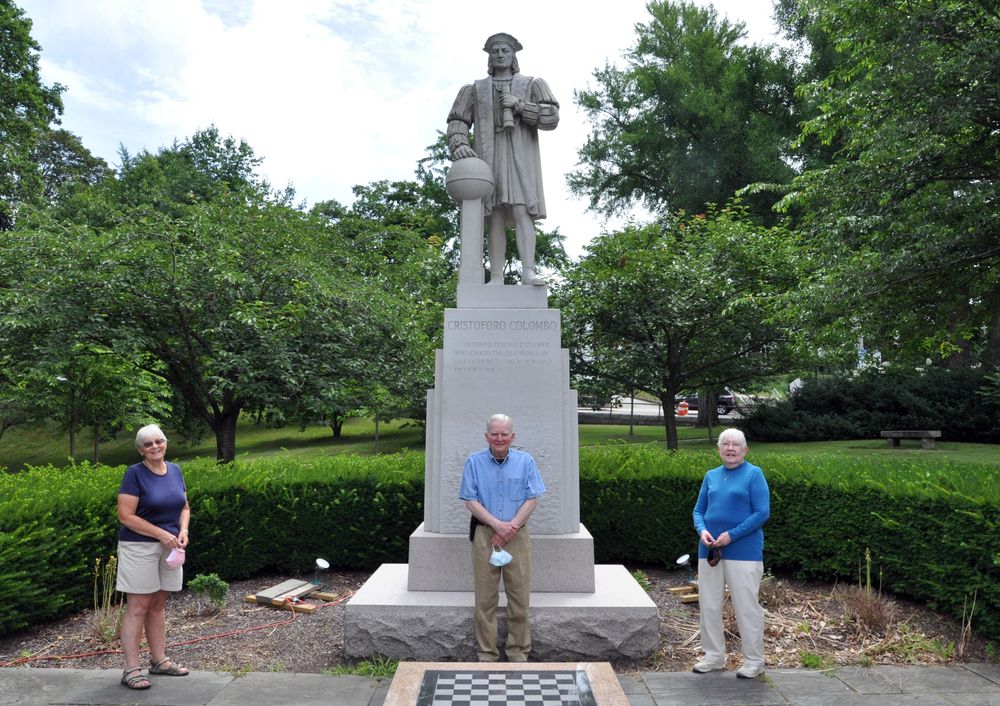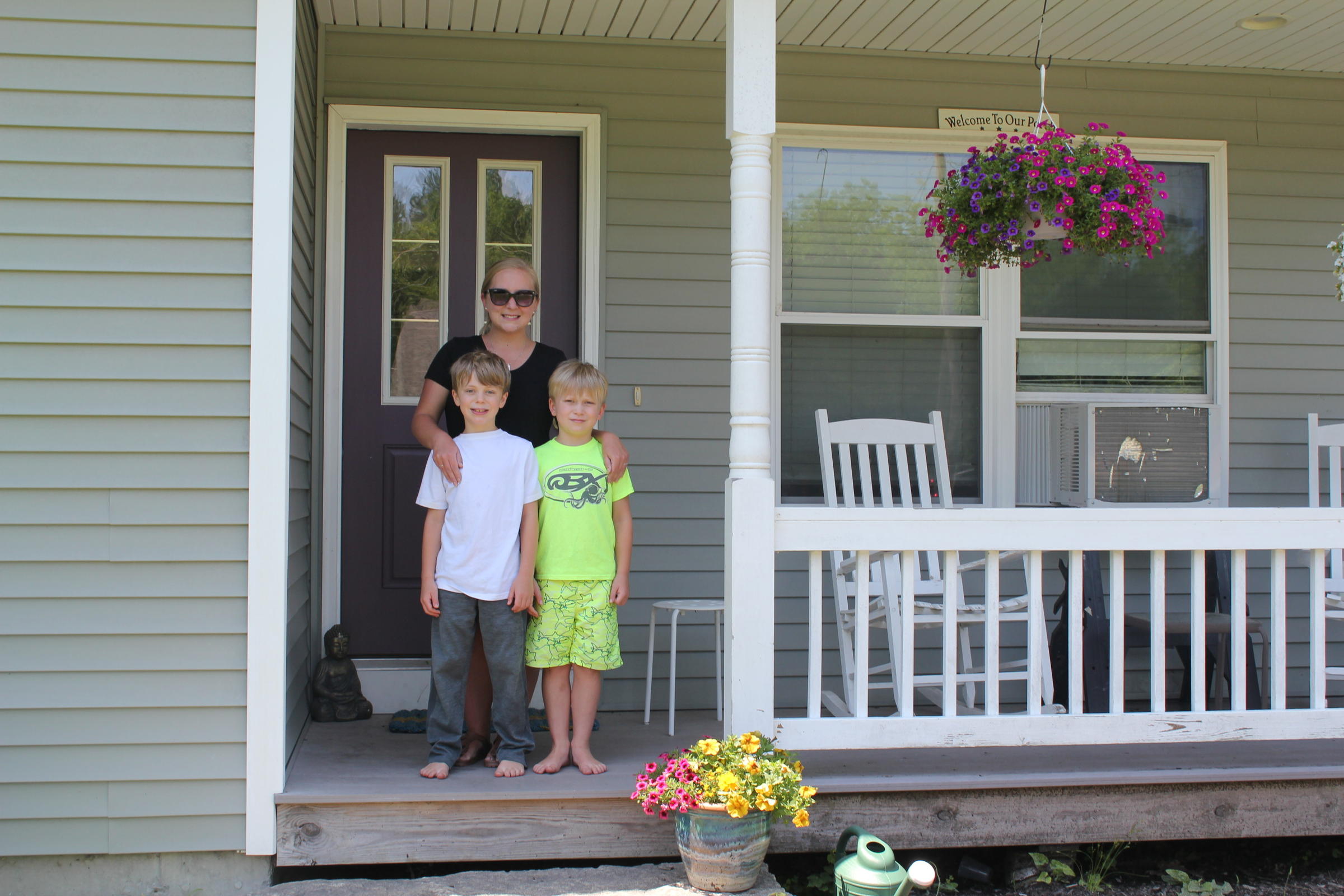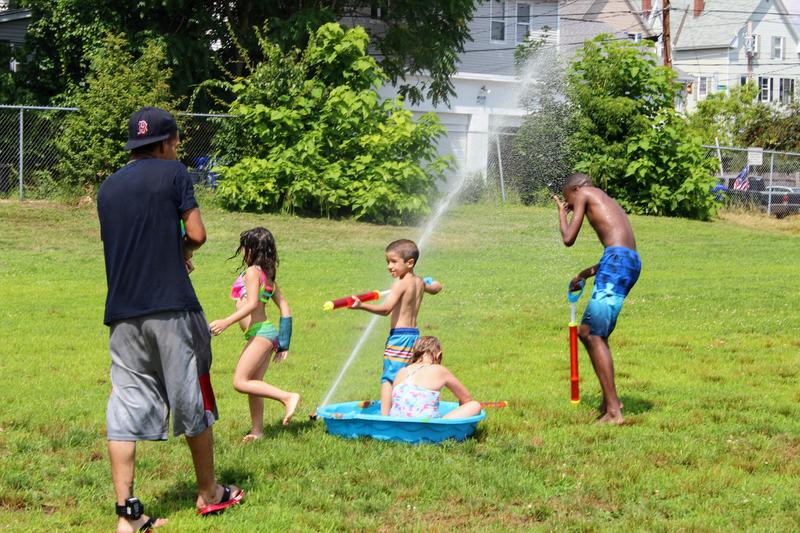Episode 208: The Debate Over Controversial Statues; Heat Waves And How COVID-19 Complicates Efforts To Stay Cool
This week on NEXT, New Englanders debate the removal of controversial statues. Plus, schools in New England are trying to figure out how to safely teach students this fall. And we look at how the pandemic and climate change are complicating efforts in New Hampshire to stay cool during this hot summer.
The RI Town That Built American Monuments Debates The Future Of Its Own Columbus Statue

Researchers Ellen Madison (left), John Corduri, and Linda Chaffee, authors of “Built From Stone: The Westerly Granite Story” in front of the Christopher Columbus statue in Westerly, R.I. (Alex Nunes/The Public’s Radio)
Alex Nunes of The Public’s Radio brings us this report: Quarry workers in Westerly, Rhode Island, unearthed some of the nation’s finest granite. Between the mid-19th and 20th centuries, the town’s expert sculptors shaped the stone into buildings, monuments, markers, graves and mausoleums that were erected in 42 states. Now, amid a national debate on public monuments, Westerly is considering the future of one statue that never left town: a 15-foot monument to Christopher Columbus.
“If we continue to commemorate Christopher Columbus and celebrate what folks call his achievements, we are celebrating genocide and we’re celebrating the death, rape, enslavement of indigenous people,” said Nanci Fiore-Chettiar, who grew up in Westerly and is calling for the statue’s removal.
Columbus statues have already been removed in multiple cities in Connecticut. In Boston last month, the city took down a Columbus statue that was vandalized. And in Bangor, Maine, the city council has considered removing or relocating a monument to a Portuguese explorer who abducted indigenous people.
“The past is never forgotten simply because a statue has been taken down,” Manisha Sinha, a Civil War historian and professor at the University of Connecticut, told NEXT in an interview.
Schools, Teachers and Parents Wrestle With Reopening Schools And Staying Safe

When schools closed in March, Ashley Muncey began helping her kids through their remote education. Muncey is pictured here with two of her kids at their home in Hollis, Maine. (Robbie Feinberg/Maine Public)
As we get closer to fall, all New England states appear to be on track to reopen public schools. But how to do that safely? It’s on a lot of people’s minds. Several states are still thinking through the options, and, in some cases, letting school districts decide if they want to return to in-person classes, virtual learning, or a combination of both. As Maine Public Radio’s Robbie Feinberg reports, the stress isn’t just on school administrators — it’s also a complicated and anxiety-inducing issue for teachers and families.
“The unknown right now is very scary for parents, and that’s what we’re facing right now, is an unknown,” said Carrie Woodcock, executive director of the Maine Parent Federation.
Sharita Fauche is the co-director of the Collaborative Parent Leadership Action Network in Massachusetts, and she has two children in a charter school in Mattapan, a Boston neighborhood. In an interview with NEXT, Fauche says what she’s looking for is choice. She wants schools to offer a hybrid option — a mix of in-person and virtual classes — so schools can be flexible to the needs of parents and students.
“To think that younger people will be able to sit in a classroom with a mask on and maintain social distancing every day, all day, it just doesn’t seem imaginable,” Fauche told NEXT.
Pandemic Complicates Cities’ Plans To Cope With Climate Change-Driven Heat Waves

Pablo Rodriguez plays in the sprinklers on an athletic field in Manchester, N.H. The city has limited ways to help residents keep cool this summer because of the pandemic. (Annie Ropeik/NHPR)
New England is experiencing more heat waves due to climate change. And staying cool is even harder this year during the pandemic, because many of the places where people would typically cool off — such as public pools and libraries — are closed. So, as New Hampshire Public Radio’s Annie Ropeik found, some families in Manchester, New Hampshire, are getting creative to cope with the heat.
“I wasn’t planning on getting wet,” Pablo Rodriguez said. But there he was on a recent hot summer day, playing in the sprinklers at a high school sports field with his kids. He said there was nowhere else to go on a day like this. Playing outside their home isn’t an option.
“That driveway — they don’t really take care of that apartment that well,” Rodriguez said. “So we don’t let the kids play outside, because there’s too many, like, broken glass, nails all over the driveway.”
Many older buildings and homes in New England don’t necessarily have air conditioning, which would help minimize the health risks of a heat wave.
“In the summer, we think of air conditioning as something nice to have, and it’s certainly helpful,” said MaryJane Walsh, program director of Project CoolAir. “But for some of these people, it is the difference between healthy living and not.”
This story is part of New Hampshire Public Radio’s climate change project “By Degrees.”
Also On This Week’s Show:
- Virus Of Hate: Tracking A Rise in Anti-Asian Harassment (WSHU)
- In A Time Of Uncertainty, Bostonians Embrace Their Community Gardens (WGBH)
- Mary Crimmins, 57, Savored Birthdays And Cultivating A Fashion Sense (NEPM)
About NEXT
NEXT is produced at Connecticut Public Radio
Host/Producer: Morgan Springer
Executive Editor: Vanessa de la Torre
Senior Director: Catie Talarski
Intern: Daniela Luna
Contributors to this episode: Alex Nunes, Cassandra Basler, Robbie Feinberg, Patrick Skahill, Annie Ropeik, Liz Neisloss and Carrie Healy.
Guests: Manisha Sinha and Sharita Fauche.
Music from New England musicians: Todd Merrell, “New England” and “Something Beautiful” by Goodnight Blue Moon, “Golden Hands” by Anjimile, “So Blue” by Audio Jane, “Save a Different Way” by Francesca Blanchard and “Tracphone” by Latrell James.
New to NEXT? You can find every episode or one you missed within our archives.
We want your feedback! Send critiques, suggestions, questions and ideas to next@ctpublic.org. Help us spread the word! If you like what you hear, rate and review us on iTunes.
